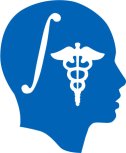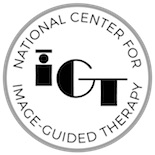Madrid-May-21-2012-Slicer-Workshop

|

|

|
Contents
Introduction
For the past seven years, the National Alliance for Medical Image Computing (NA-MIC), one of the seven National Centers for Biomedical Computing, part of the NIH Roadmap for medical research, has converted some of the major scientific advances made by the biomedical imaging community into open-source software tools, to fasten the deployment of cutting-edge image analysis and visualization techniques on a national and international scale.
As part of the NA-MIC toolkit, the 3D Slicer open-source software has been developed as a technology delivery platform that is both easy to use for clinical researchers, and easy to extend for software developers. 3D Slicer has become a multi-institution effort to share the latest advances in image analysis with the scientific and clinical community. To foster the translation of NA-MIC technology to clinical research applications, the NA-MIC Training Core has developed a series of courses and tutorials on medical image analysis topics using the software. This workshop combines a series of lectures and 3DSlicer hands-on sessions, and includes a poster presentation by local scientific teams to provide a forum for exchange and discussion on medical imaging research.
This workshop is organized in collaboration with the Madrid-MIT+Vision Consortium.
Local Organizer
- Norberto Malpica, Ph.D., Universidad Rey Juan Carlos, Mostoles, Madrid, Espana
Faculty
- Ron Kikinis, M.D., Surgical Planning Laboratory, Harvard Medical School, Boston, USA
- Polina Golland, Ph.D., Computer Science and Artificial Intelligence Laboratory, MIT, Cambridge, USA
- Sonia Pujol, Ph.D., Surgical Planning Laboratory, Harvard Medical School, Boston, USA
Tentative Agenda
| Time | Monday, May 21, 2012 | ||
| 8:30-9:00 | Computer set-up and assistance by course instructors | ||
| 9:00-9:10 | Welcome and Presentation of day activities (Ron Kikinis/Sonia Pujol) | ||
| 9:10-09:35 | Presentation of the Madrid-MIT M+Vision Consortium (Norberto Malpica) | ||
| 09:35-10:00 | 3DSlicer: an open-source platform for collaborative research (Ron Kikinis) | ||
| 10:00-11:15 | Hands-on Session 1: Data Loading and 3D Visualization (Sonia Pujol) | ||
| 11:15-11:30 | Coffee-break | ||
| 11:30-12:00 | Algorithm Development within NA-MIC (Polina Golland) | ||
| 12:00-13:30 | Lunch Break | ||
| 13:30-15:15 | Hands-on Session 2: Programming into Slicer4 (Sonia Pujol) | ||
| 15:15-15:30 | Coffee-Break | ||
| 15:30-17:00 | Poster/demo session by local research teams | ||
| 17:00-17:30 | Questions from the audience and discussion | ||
| Time | Tuesday, May 22, 2012 | ||
| 09:00-10:15 | Hands-on Session 3: Diffusion Tensor Imaging (Sonia Pujol) | ||
| 10:15-11:30 | Hands-on Session 4: Neurosurgical Planning (Sonia Pujol) | ||
| 11:30-11:45 | Coffee Break | ||
| 12:00-12:30 | Towards validation of DTI tractography (Sonia Pujol) | ||
| 12:30-13:00 | Concluding Remarks and Discussion | ||
Logistics
- Dates: The workshop will be held on Monday May 21 and Tuesday May 22, 2012.
- Location: TBA
- Registration: Please fill in the Workshop Registration Form and send it by e-mail to Almudena García (almudena.garcia.fernandez at urjc.es )
Preparation for the workshop
- Hardware: The workshop combines oral presentations and instructor-led hands-on sessions using the 3DSlicer software version 4.
All participants are required to come with their own laptop computer and install the software and datasets prior to the event. A minimum of 1 GB of RAM (4 GB is better) and a graphic accelerator with 64mb (512MB is better) of on-board graphic memory are required. Shared memory graphics boards have significantly poorer performance.
- Software and datasets
The workshop software and datasets will be posted a few weeks before the event. The following OS will be supported: MacOS X Lion, Windows7 64-bit, Windows7 32-bit and Linux 64.
Slicer Community
Participants are invited to join the Slicer user and Slicer developer mailing lists prior to the workshop. This is a place for the Slicer community to discuss questions and feature requests related to 3D Slicer.
Slicer4 Training Survey
After the workshop, participants will be invited to take the Slicer4 Training Survey to provide feedback and suggestions.

